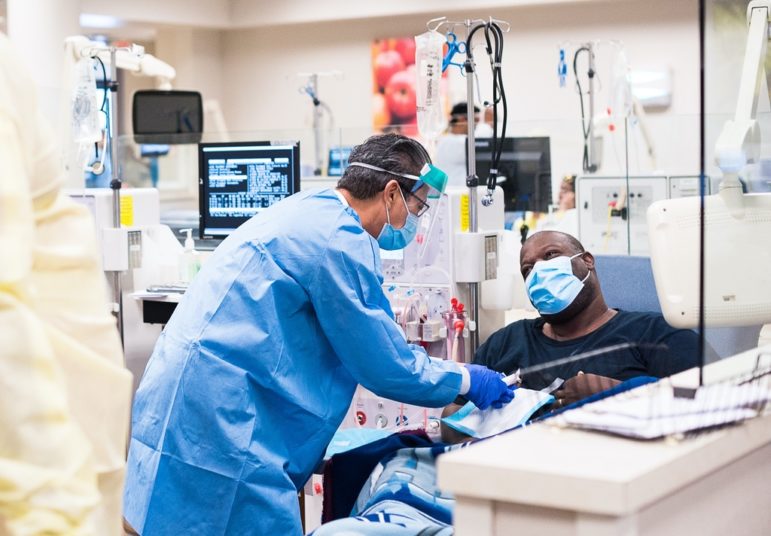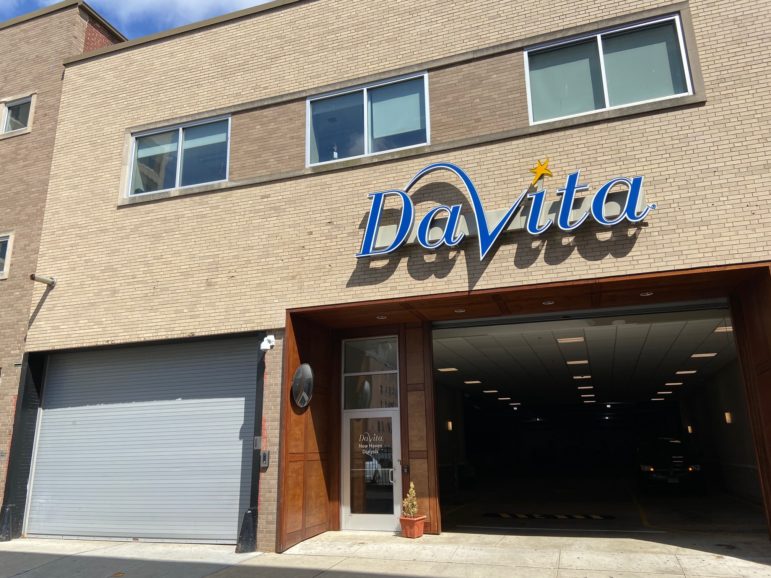By Cara Rosner
The COVID-19 pandemic will likely result in a “huge paradigm shift” toward in-home dialysis treatments in the future, experts predict.
Home “is the safest place for them to be,” said Dr. Holly Kramer, president of the National Kidney Foundation and a practicing nephrologist. In times like this, immunocompromised individuals are at increased risk of becoming ill.
Roughly 85% of dialysis patients get their treatments in centers—often three days a week, and typically for several hours at a time—where other dialysis patients also are being treated, she said. Before the COVID-19 outbreak, nephrologists nationwide were urging a growing number of patients to consider at-home care, she said, and the pandemic “will push things much, much faster” in that direction.

DaVita Intregrated Care Photo.
African Americans have an increase risk of developing kidney failure due to high rates of diabetes, heart disease and high blood pressure.
“It’s a huge paradigm shift for the nephrology community,” she said. Already, some patients want to switch to in-home treatments, she added, but it’s a somewhat lengthy process.
“The patient can’t just be in a center one day, and the next day they’re home,” she said. In many cases, in-home treatment requires patients to get an abdominal catheter, which must be surgically inserted in a hospital. Then patients typically need two weeks of intense training to learn how to undergo home treatments safely, she said.
Since dialysis patients have a pre-existing condition, they are at increased risk of contracting COVID-19. In 2018, 612 people in Connecticut died from kidney disease, up from 554 people in 2017, according to the U.S. Centers for Disease Control and Prevention. Nationwide, about 37 million adults suffer from chronic kidney disease, according to the Kidney Foundation.
African Americans have an increased risk of developing kidney failure due to high rates of diabetes, heart disease and high blood pressure. They also suffer from kidney failure at three times the rate of Caucasians, the Kidney Foundation reports.
Some dialysis centers already offer in-home treatment as an option. As interest in that grows, so too will demand for telehealth services, said Dr. David Roer, vice president of medical affairs at Colorado-based DaVita Integrated Kidney Care, which operates 26 dialysis centers in Connecticut.
“The pandemic will likely be a catalyst for telehealth adoption for our home patients and physicians, as we are already seeing industry-wide,” he said. “This is especially pertinent at this time when limiting exposure to others will increase safety measures for all our patients, teammates and physicians.”
In dialysis, patients with kidney disease or failure undergo a process to remove extra water and toxins from the blood since their kidneys can’t perform those functions naturally. As the general population is increasingly advised to stay home, many dialysis patients must leave their houses for the lifesaving treatments.
“I think they’re all really worried about getting infected,” Kramer said. “Also, if they do get infected, they’re more likely to develop really severe complications.”
Dialysis centers have increased safety protocols to protect patients and employees alike.
“We treat some of health care’s most complex, at-risk patients,” Roer said. “Our team of professionals is working hard to help keep our dialysis patients safe, healthy and out of the hospital.”

C-HIT Photo.
DaVita has 26 dialysis centers in the state including this one on Center Street, New Haven.
There are 50 dialysis centers in Connecticut, according to Dialysis Compare, a website run by the Centers for Medicare & Medicaid Services. Of those, half have five-star ratings—the highest available—for quality of patient care. Most of the state’s centers are owned by DaVita, which has implemented various measures to protect patients, physicians and employees during the pandemic.
“The health and safety of our dialysis patients and care teams is our top priority,” Roer said.
“Our efforts include evaluating everyone before they enter our center, the use of masks for every patient and care team member, and restricting unnecessary visitors to help reduce the possibility of exposure.”
He added: “Dialysis is not optional; it’s life-sustaining. Many of our patients have diabetes and or heart disease in addition to kidney failure, putting them at a greater risk if they are exposed to COVID-19.”
Massachusetts-based Fresenius Kidney Care operates two dialysis centers in Connecticut and also has increased safety protocols. In a letter to patients, CEO Bill Valle said everyone entering facilities is asked about fever, cough and foreign travel. Visitors are prohibited. All staff members wear masks, full protective gowns and gloves while with patients. And anyone who develops a fever, cough or other acute symptoms is being referred to a hospital. Also, centers are being “intensively disinfected” on a daily and ongoing basis, he said.
In the meantime, COVID-19 is already altering the way providers are delivering care. Fresenius and DaVita recently announced they are working with U.S. Renal Care, American Renal Associates, Satellite Healthcare and other dialysis organizations to create a national contingency plan. The organizations have designated capacity in certain clinics nationwide to create isolation units where patients who are or may be COVID-19 positive can receive dialysis.
Also, DaVita recently said it will pay approximately 55,000 employees nationwide an extra $100 per week through May 2, as well as offer back-up child care programs, modified sick leave policies and financial assistance to employees or their immediate dependents. Fresenius announced it will offer child-care and elder-care stipends to all direct patient care employees, including dialysis nurses, and will compensate direct patient care employees with “emergency pay” in addition to regular wages.
Support Our Work
The Conn. Health I-Team is dedicated to producing original, responsible, in-depth journalism on key issues of health and safety that affect our readers, and helping them make informed health care choices. As a nonprofit, we rely on donations to help fund our work.Donate Now
Related Stories
- State’s Dialysis Centers Rate High, With Some Exceptions, New Data Show Five dialysis facilities in Connecticut received low quality-of-care scores under a new Medicare rating system, including one center cited for a high death rate, while 11 facilities received the highest rating possible, federal data show. Connecticut has 45 dialysis facilities in the Medicare program, all but four of them for-profit.
More From C-HIT
- Disparities COVID-19 Risks Could Speed Transitions To At-Home Dialysis
- Environmental Health Staying Home: Nice Work If You Can Get It
- Fines & Sanctions UPDATED: Coronavirus In Connecticut — FAQs, Resources
- Health Care Health Bills’ Failure A Bitter Pill For Health Care Proponents
- I-Team In-Depth Pushed To The Limit: Community Health Centers Ramp Up Telemedicine While Juggling Declines In Patient Visits, Furloughs And Sick Care Providers

